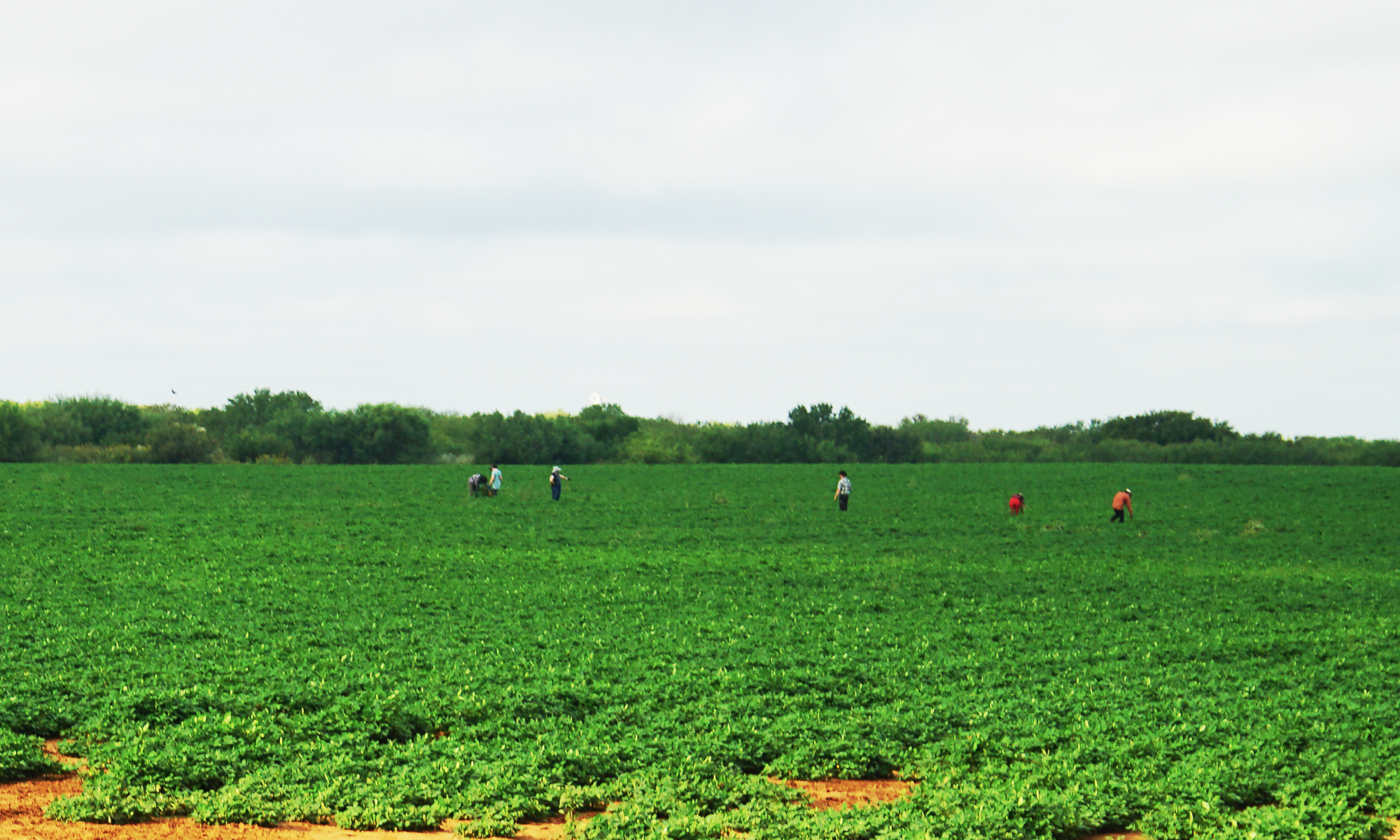By Ken Jarvis and Leisa Parsons, Area Media Specialists
Approximately every other week a San Antonio Area stake goes to the Latter-day Saint peanut farm, near Pearsall, to pull weeds. Last weekend Brother and Sister Daniel Hatcher and their family went to work at the farm. They just moved into the San Antonio 6th Ward less than two months ago. Even as new ward members the entire family responded to the call to go to the Church farm last month.

They enjoyed the work so much they came back on their own. Brother Hatcher said, “When we proposed to the kids the idea of returning, they all agreed they wanted to come back. As parents we feel this teaches them to buckle down and work hard.” He added that they like the idea of service. “We’re helping produce peanuts to make peanut butter.”

That was very much the theme that Brother Dan Roberts, Farm Manager, stresses when he welcomes the volunteers to the farm. He talks about the importance of growing peanuts. “There is a great need in the world today,” he said. “Just turn on the television and you’ll see that the problem of enough food is very close to home. What we’re doing here can help with that problem. This farm is more than just peanuts. Its feeding people and helping people to feel better.”

Today, over 45,000 pounds of peanut butter, from peanuts grown at the Church farm near Pearsall, arrived at the San Antonio Food Bank to be distributed to families across San Antonio.

Two trucks from the Church of Jesus Christ of Latter-day Saints pulled in this morning to the San Antonio Food Bank. One truck held the peanut butter and another truck brought 39,300 pounds of other food items to be distributed to local food pantries. For reference, approximately 10 pounds of food provides seven meals.

The food and peanut butter will be distributed among several different organizations.

Jeffery Conaway from the Antioch Missionary Baptist Church oversees their Erna Baker Food Bank and Clothing Ministry. He said: “On the east side of San Antonio, there’s a much greater need because of the children being home, plus most of our parents are either on food stamps or have a very limited amount of money to spend. They come to our food bank, there’s only three in the area, to be able to feed their families…. We try our best to have stuff on hand to give out each week. We partner with the San Antonio Food Bank, and now with the Church of Jesus Christ of Latter-day Saints, and we praise God for this food.”

Dennis Westberg of Coker United Methodist Church, said they too have seen a steady increase in those needing assistance. The number of families served from their food pantry each week has almost doubled from pre-COVID numbers.

Today’s food will help several food pantries that have seen similar increases in need among the families they serve. The Food Bank and Catholic Charities will receive the bulk of the food, with Antioch Baptist, Coker Methodist, Bulverde Food Pantry and West Avenue Compassion receiving the rest of the food.

Due to increased food insecurity nationwide, several suppliers have also been taxed and have not been able to keep up with demands by food banks and charities. A representative of the San Antonio Food Bank asked about possibly using the Church’s food supplier to help with demand. Bishop Bruce Baillio explained that 80% of all the food that the Church donates is produced by the Church through farms and factories like the peanut farm.

For all those who help the underserved in our communities, it is a labor of love. The story of the peanut butter that arrived today is also one of a labor of love.

After the peanuts leave our Pearsall Peanut farm, they go to a sheller that removes the outside shell and other debris. They are packaged into bags weighing 2,200 pounds and delivered to the Houston Peanut Plant which is owned and operated by Welfare Services of the Church of Jesus Christ of Latter-day Saints.

From there, the peanuts are dumped into a roaster.

Then they go through a blancher that removes the heart of the peanut and any skin that might still be on the peanuts.

They go through an automatic sorter that removes any off-color or burnt peanuts.

Then they go through two grinders that make the peanut butter smooth.

In the second grinder, small amounts of sugar, salt and stabilizer are added.

From there, they go through a chiller to cool it down before it goes into the jars.

Finally it is boxed up so it can be sent to Salt Lake, where it is distributed to Bishop’s Storehouses and participating Food Banks across the country. Ironically, our peanut butter has made a long trip back home to Texas.

The production of peanut butter is all paid for by donations and most of the work is done by volunteers. Volunteers serve because they follow the teaching of Jesus to love their neighbors. Whether that service is handing out food or pulling weeds, it is a labor of love.
